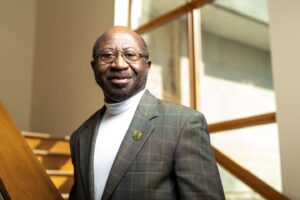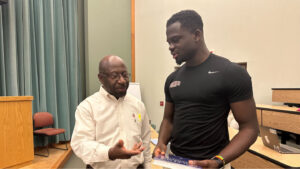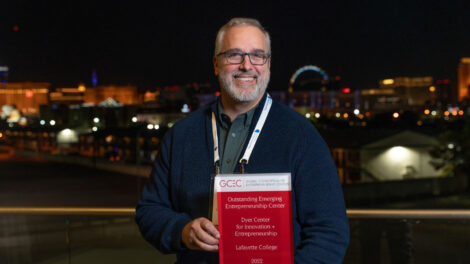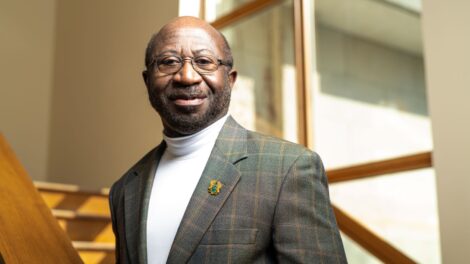Prof. Ahene pauses retirement to teach Dyer Center real estate seminar
By Bryan Hay
Rex Ahene, professor emeritus of economics, knows too well that it’s difficult to step away from the rich academic community at Lafayette College.
Barely a year out of retirement, Ahene is back in the classroom leading a Dyer Center for Innovation and Entrepreneurship-sponsored seminar on real estate, his original area of interest from his undergraduate days at University of Science and Technology in Kumasi, Ghana, and his secondary area of specialization during his graduate years at University of Wisconsin, Madison.

Rex Ahene, professor emeritus of economics
“I could not pass up this opportunity to get back into a professional area of deep personal interest,” says Ahene, who officially retired at the end of the spring 2022 semester after a distinguished 40 years as a professor of economics and as an influential leader in cultivating diversity and inclusion at Lafayette.
With expertise in real estate and land policy, he served as a policy adviser to many national governments, multilateral development institutions, academic institutions, and think tanks on how restructuring property and economic rights can enable markets and free enterprise to redress the ill effects of colonialism and underdevelopment, especially in post-colonial countries throughout Africa.
Ahene’s most recent work has involved finalizing the primary policy on land and natural resources in Sierra Leone, and bringing the principles of participatory democracy and public policy to that country while helping to alleviate poverty and improve food security.
All of that land use and real estate experience aligns with the seminar, which complements Lafayette’s interdisciplinary culture, says Ahene, the Dyer Center Real Estate Adviser-in-Residence.
“We have so many students who are interested in getting into real estate in some capacity,” he says. “Not everybody wants to be an investor. But the real estate sector is so interdisciplinary that it ties in very well with practically every major and every discipline that we have on campus.”

Rex Ahene, professor emeritus of economics, is teaching a Dyer Center seminar on real estate this semester
Through a series of guest presenters from the real estate industry, many of them alums, Ahene’s seminar provides his students with the theoretical framework, as well as valuable foundational skills in preparation for possible career interface with the real estate sector and practical information that could be used by students interested in the annual Real Estate Case Competition on May 3, one of the Dyer Center’s signature events.
During a recent class, which meets Wednesday nights in the Simon Center auditorium, Ahene’s 24 highly engaged students heard from representatives of City Center Investment Corp., which has brought many mixed-use development projects to downtown Allentown, Pa.
As Ahene and his students listened intently and took notes, City Center’s Robert DiLorenzo, director of planning and construction, and Jack Reilly ’18, associate project manager, described the myriad steps and considerations that must be addressed before a spade of soil is turned over for a real estate project. They almost always include conceptualization and selling a vision that often accommodates the aspirations of local community stakeholders, construction costs and overhead, historical review, planning and zoning board approvals, possible on-site environmental remediation, consideration of short- or long-term leases for retail tenants, and even choice of building materials, right down to types of bathroom tile.
Another fortunate coincidence recognized by Ahene is that the city of Easton is undergoing a rapid economic and cultural revival, driven by a strategy promoting in-fill real estate development projects to catalyze growth and community revitalization. Several recent mixed-use development projects merging multiple uses into a single project have been favored by the city because they promote more efficient land use that offers many benefits. Because of their scale and complexity, mixed-use developments tend to be more regulated by local governments and more challenging to finance due to greater uncertainty risk.
Recognizing the opportunities for experiential learning for his students downtown, Ahene is working closely with John W. Kingsley, director of community and economic development for the city of Easton, and several private developers to use some of the ongoing projects in Easton as case studies for his students. According to Ahene, “You couldn’t have designed a better scenario for learning about real estate investment decision-making than what is happening right here in downtown Easton.”
Stephanie Chapman Olivo ’26 (government & law and economics & finance) decided to enroll in the seminar when she heard Ahene was teaching it.
“I was excited, especially since I heard that he had retired. With him coming back to teach a class, I knew it was an opportunity I wasn’t going to find again,” she says. “I’m finding that all of my classes are intersecting because I’m also taking international politics and economics. I feel like a lot of the terms that we talk about in the real estate class apply in an interdisciplinary way.”
Olivo, who’s considering a career in real estate law, has particularly enjoyed Ahene’s discussions around gentrification and how it’s a byproduct of capitalism, and has appreciated the sense of community and diversity reflected in the seminar.
“He’s a really intelligent man, and it’s been a valuable experience getting to learn from him,” she adds. “There’s also a strong presence of people of color in the class, which is amazing. It’s a community where everyone is willing to talk to each other and help each other out.”
Jalalle Nourenie ’24 (mathematics, economics, and engineering studies) says he took the seminar because of his previous participation in the real estate competition and his interest in possibly pursuing real estate as a career opportunity.
“I’m enjoying the guest speakers, who are pretty knowledgeable and bring a lot of knowledge gained from working directly in the real estate field,” says Nourenie, who admires Ahene not only his for his real estate knowledge but also for instilling a sense of community in the seminar along with his work with campus organizations such as the Association of Black Collegians and Brothers of Lafayette.
There’s no escaping real estate, Ahene says.
“In real life, all of us have to interact with real estate at some point,” he says. “The more I talk to students who are interested in real estate and want to understand how the real estate sector works and what kind of skill set they should acquire, the more I am inspired to mentor and advise students and have thought-provoking conversations with them.”
Bringing Ahene into the Dyer Center has been crucial to the expansion and sustainability of its efforts in encouraging students to learn more about real estate as a career opportunity and to engage with active and committed alumni involved in the real estate industry, says Tobias Rossmann, associate professor of mechanical engineering and Dyer Center interim director.
“Rex’s deep knowledge in the subject area and his passion for mentoring provide tremendous value to our interested students,” Rossmann says. “Also, he is able to engage a wide array of real estate practitioners who then closely interact with students in coursework, co-curricular workshops, and competitions.”
A purely Lafayette experience
“Well, what else could be better? We teach problem-solving skills at Lafayette, and we support liberal ideas about society and humanity in general, based on major and minor disciplines we provide,” Ahene says. “We live, work, and play in physical spaces that are shaped by the built environment, basically in real estate spaces. Open spaces, public parks, conservation areas, offices, and industrial buildings and warehouses are physical spaces within which we operate. And every discipline on campus is training students to solve problems that move and shape the human experience.
“The idea of introducing students from all disciplines to understand what role real estate plays in our life is what drove me to teach the course.”

